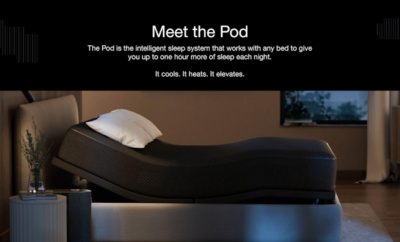
Health x Wellness
ResMed finds stress and anxiety are keeping people up at night
ResMed’s Global Sleep Survey finds that stress has had an impact on their sleep since the start of the pandemic.
ResMed 2022 Global Sleep Survey was conducted in the first quarter of the year and asked over 23,000 respondents in 12 countries what’s keeping them up at night.
Across most countries, a majority of respondents reported that stress has had an impact on their sleep since the start of the pandemic. In Singapore, work-related concerns were the leading factor, with 33 percent of respondents citing them as a reason for not sleeping well at night. Beyond work-related concerns, respondents in Singapore listed depression and anxiety (26 percent), financial pressures (25 percent), and family pressures (23 percent) as common reasons for not sleeping well.
Interestingly, 61 percent of Singapore respondents reported sleeping better or longer while working remotely. 57 percent of them believe that the return to working from the office (stated as more in-office time) will make it difficult to wake up in the morning.
Over 40 percent of respondents reported that they were not satisfied with either the quality or quantity of their sleep and 34 percent also said they usually feel tired.
Turning to unhealthy habits to help cope with being unable to fall asleep
To fall asleep, respondents reported binge-watching television shows (34 percent), staying up later to induce tiredness (21 percent), reading (13 percent) and gaming (12 percent)
Sleep issues could be a symptom of an underlying health condition
An overwhelming majority of respondents in Singapore (76 percent) also say their doctor has never proactively asked them about the quality of their sleep – the highest percentage of all countries covered in the survey.
61 percent of respondents in Singapore reported snoring or being told they snore, but only 35 percent are concerned about health implications tied to snoring.
People may think they are sleeping soundly when in fact, they are repeatedly and unconsciously waking up throughout the night due to undiagnosed sleep apnea – of which snoring is the number one symptom.

We discussed the awareness of sleep quality and health habits with Justin Leong, President, Asia and Latin America at ResMed.
the Active Age (AA): What are the areas of awareness about sleep quality and health habits that people need to know about?
Justin Leong (JL): One misconception about sleep is that getting 4-6 hours is sufficient. While people may get through one or two days of short sleep, it’s not a healthy habit. Sleep quality has a direct impact on overall health and well-being, which is why it is important for every person to understand their sleep habits, get sufficient sleep, or consider professional help to understand if they are suffering from poor sleep quality due to underlying conditions.
ResMed recently conducted a survey titled “ResMed Global Sleep Surveys” in 12 countries during the first quarter of the year to examine the effects of sleep habits on overall health. Data showed us that the top three reasons for poor sleep cited by respondents globally included work-related concerns, financial pressures, and family pressures. The RedMed Global Sleep Surveys also found that only 12 percent of respondents in Singapore have been tested for sleep apnea.
It is important that people understand that good, restorative sleep can not only help you stay alert during the day, but also enables your body to recharge from the day’s activities (e.g., that stressful meeting, hour-long workout), and prepare for tomorrow.
Scientists have identified several stages of sleep, including light sleep, deep sleep, and REM (rapid eye movement) sleep. If your sleep is too short or disrupted, you won’t achieve the full sleep cycle you need to properly recharge your mind and body each night. If you are getting the recommended 7 to 9 hours of sleep for an average adult, but still feel tired during the day, talk to your doctor about your symptoms. You may be getting enough sleep but the quality of the sleep may be poor, and a doctor can help you.
A lack of deep sleep (REM sleep), and interruptive sleep, can result in detriments to your health. These can range from minor annoyances such as yawning, to more serious effects like daytime sleepiness, morning headahces, and irritability. These symptoms could indicate a more serious condition or sleep disorder such as sleep apnea.
AA: Where can people source credible information about such topics?
JL: We recommend consulting with your doctor, who can refer you to a sleep specialist at a sleep clinic for subsequent diagnosis and treatment. There are also a couple of online screening assessments that can help you determine if you may benefit from seeing a doctor for your sleep, including ResMed’s online sleep apnea assessment tool.
AA: From ResMed’s perspective, how would a layperson go about identifying if they have sleep apnea due to poor sleep quality or snoring?
JL: If you find that sleep apnea symptoms have repeatedly and consistently affected the quality of your sleep, it would be best to start a conversation with your doctor about your sleep problems to ascertain your risk of having a sleep disorder like sleep apnea or insomnia. Doing so would be a great first step towards solving your sleep issues and ultimately improving your overall health. You can ask your doctor to arrange a sleep test for you.
Sleep apnea is when a person’s breathing is interrupted during sleep. Snoring is a common indicator of sleep apnea but some people, especially females, can suffer from sleep apnea without obvious snoring. Sleep apnea can affect anyone, regardless of age, gender, and fitness levels, and studies have shown that it affects 1 in 3 people worldwide. It is often accompanied by other symptoms, like excess daytime sleepiness, poor concentration, morning headaches, forgetfulness, fatigue, and a depressed mood.
Disclaimer provided by ResMed: This content is for general information only and not a substitute for medical advice. Lack of sleep can be indicative of a range of health conditions. Please consult your doctor for advice on health-related matters.
Photo by JESHOOTS.COM on Unsplash









